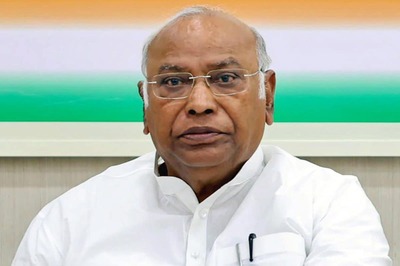
views
New Delhi: Just yards from the east London street where riots erupted on Monday stands a house for sale that sums up the depth of division in the area.
With five bedrooms, three bathrooms and its own coach house, the elegant property has been put up for sale with an asking price of 1.7 million pounds. The main attraction, according to the advert, is the sought-after location.
Many residents of the diverse borough of Hackney said it was this ever widening and very visible gap between the rich and poor that has exacerbated tension in recent years, especially as government cuts to welfare payments have started to bite.
Britain, one of the world's major economies, has a bigger gap between rich and poor than more than three-quarters of other Organisation for Economic Cooperation and Development (OECD) countries, according to a 2008 report. Charities in Britain say that inequality is most keenly felt in London.
"It's us versus them, the police, the system," said an unemployed man of Kurdish origin in his early 20s, sitting at the entrance to a Hackney housing estate with four Afro-Caribbean friends who nodded in agreement.
"They call it looting and criminality. It's not that. There's a real hatred against the system," he added, listing what he saw as the police prejudice, discrimination and lack of opportunity that led him and his friends to loot shops, torch bins and hurl missiles at police Monday.
"There's two worlds in this borough. More and more middle classes are coming and we're being pushed out. The shops are pricing stuff like it's the West End, we can't afford the rents. We're the outcasts, we're not wanted any more.
"There's nothing for us."
Those who were out on the streets Monday night, and those who had gathered amid the debris Tuesday morning, said there was no interaction between the two distinct communities, even though they live practically on top of each other.
The rioting in Hackney was the third night of violence across the capital, sparked by the fatal shooting by police of a man in another poor borough.
"Youths are frustrated, they want all the nice clothes. They ain't got no money, they don't have jobs," a 41-year-old youth worker told Reuters, stood outside the Pembury estate, the scene of much of the trouble Monday night and home to mostly young black people.
"To live, to have money in their pocket, they have to thieve, they have to rob.
"The people that run this country, they got money, they are rich, they got nice houses. They don't care about poor people."
"Screwing the system"
The statistics confirm the problem.
In 2007 Hackney was ranked the second most deprived local authority in England, behind Liverpool. More than 10 percent are unemployed. Some 11,000 people rely on state benefits to live, meaning some 24 people are competing for every available job.
According to the council, Hackney is ranked sixth out of the 32 London boroughs in terms of crime.
At the same time, small one-bedroom flats regularly cost some 300,000 pounds. On a nearby street, smart cafes are full of young families attracted to the parks and transport links to the nearby financial district. Pricey organic food shops stand next to 'pound shops' -- where all the items cost one pound.
Professor Mike Hardy of the Institute of Community Cohesion said it was not just the division between rich and poor that caused the problem, but the fact they lived so closely together.
"There is a much greater visibility of the difference," he told Reuters. "In London, the current troubles are almost focussed entirely not on a cause or a protest, but on greed and personal want. 'I haven't got something and I can take it'."
Britain's coalition government has made deep spending cuts since coming into power last year to tackle a big budget deficit. The poor say they have been hit hardest, with people in Hackney pointing to the closure of many services.
"The only way we can get out of this is education, and we're not entitled to it, because of the cuts. Even for bricklaying you need a qualification and a waiting list for a course. I signed up in November, and still haven't heard back," the Kurdish man said.
The government has also raised university tuition fees since coming into power, putting a higher education further out of the reach of youths from places like Hackney.
"They're screwing the system so only white middle-class kids can get an education," said another man, who declined to be named. He said politicians were the real criminals, and pointed to a 2009 expenses scandal in which several lawmakers were revealed to have cheated the taxpayer out of thousands of pounds.
"The politicians say that we loot and rob. They are the original gangsters. They talk about copycat crimes. They're the ones that's looting, they're the originals," he said.
One of the Kurdish man's friends pointed to alleged payments made to the police by journalists, claims currently under investigation as part of a wider phone-hacking scandal centred on the now defunct News of the World newspaper, part of Rupert Murdoch's News Corp media conglomerate.
"Everyone's heard about the police taking bribes, the members of parliament stealing thousands with their expenses. They set the example. It's time to loot," the youth said.




















Comments
0 comment